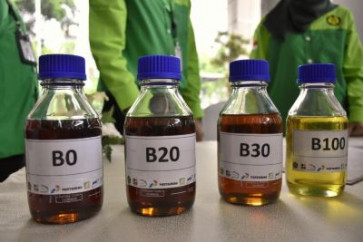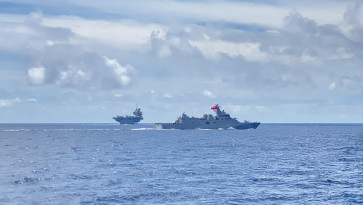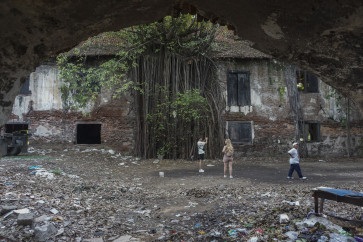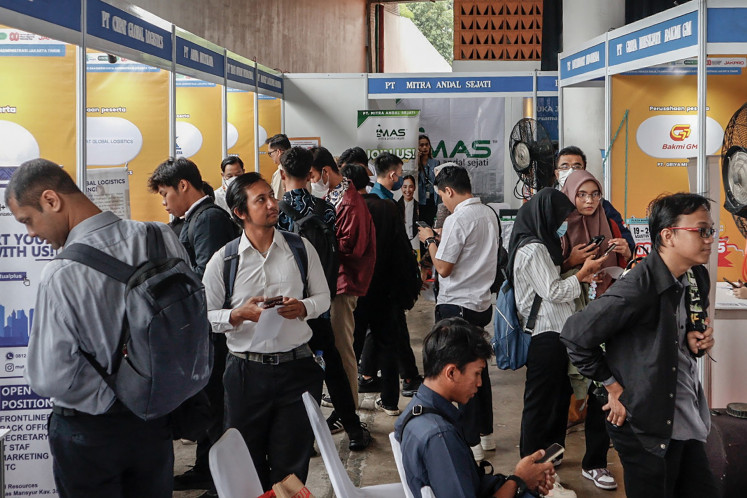Popular Reads
Top Results
Can't find what you're looking for?
View all search resultsPopular Reads
Top Results
Can't find what you're looking for?
View all search resultsMixed reactions to eased textile imports
Textile and garment businesspeople had mixed reactions on the latest simplification of import procedures for textile and textile products (TPT), including fibers, yarns and fabrics with some opposing it for its potential to disrupt local textile suppliers
Change text size
Gift Premium Articles
to Anyone
T
extile and garment businesspeople had mixed reactions on the latest simplification of import procedures for textile and textile products (TPT), including fibers, yarns and fabrics with some opposing it for its potential to disrupt local textile suppliers.
Indonesian Textile Association (API) chairman Ade Sudrajat said the simpler import procedure allows garment or clothing manufacturers to have more varieties of raw materials aside from those supplied by local textile suppliers.
The Indonesian Association of Synthetic Fiber Producers (APSyFI) opposed the policy, warning that it would lead to unfair competition between foreign and local textile suppliers, as the latter still suffers from high production costs such as high gas prices and wages.
The Trade Ministry has recently issued Regulation No. 64/2017 on textile import, allowing Common Importers Identification Numbers (API-U) holders, who are usually traders, to import textiles and textile products and have the goods inspected by the government’s appointed surveyor in the bonded logistics centers (PLB).
Previously, only Producers’ Importers Identification Numbers (API-P) holders were allowed to import textiles and textile products.
This led to bulk imports, where customs officials let traders mix various materials into one container and register the cargo as one textile product that is subject to the low import tax.
The policy is part of the government’s efforts to cut dwell time at the port and provide small and medium manufacturing (IKM) with raw materials supplies by simplifying inspection procedures, as committed in the 15th economic policy package.
Ade said the new policy would stop bulk import practices and let imported textile be taxed appropriately. This way, “local and foreign textile can compete fairly because they are both taxed properly,” he said recently.
“Now that API-U holders or traders are allowed to import, there would be less bulk import practices. Traders can now import textiles and textile products and be transparent to the government about it. They would keep the goods in PLB,” Ade said.
PLB, he further said, was where importers and customs facilities integrate, “so whoever the importers are, their goods must have been taxed.”
Responding to this, APSyFI executive member Prama Yudha Amdan said that from the trade point, the new policy indeed provided a clearer chain in terms of the tax payment.
But from industrial point of view, it led to unfair competition as local textile is burdened with higher production costs compared to other countries like India, China and Bangladesh.
“The impact is [garment] producers who usually used local textile could shift to import materials,” he said. Any decline in local textile use consequently leads to decline in factories’ utility rate.
APSyFI data shows local industry utility rate plunged last year due to high production costs.
National fibers producing plants utility rate dropped to 81 percent from 83.8 percent (2015), yarn plants to 76.7 percent from 79 percent and fabrics to 52.6 percent from 54.5 percent.
Only the utility rate of garment plants increased to 80 percent from 75.7 percent.
The textile producers demanded that the government continue the Finance Ministry’s strict monitoring on high-risk bulk import practice (PIBT) that has shown positive results in the form of declining imports.
Textile upstream industry utility rate has increased by 10 to 15 percent during PIBT’s implementation, APSyFI recorded.
Yudha said the intention to simplify import procedure was meant to help small and medium manufacturers [IKMs] in getting raw materials.
“But now why does the government allow traders to also import? This raises a question: does the government want to make Indonesia a country of importers or an industrial country?” he said.










